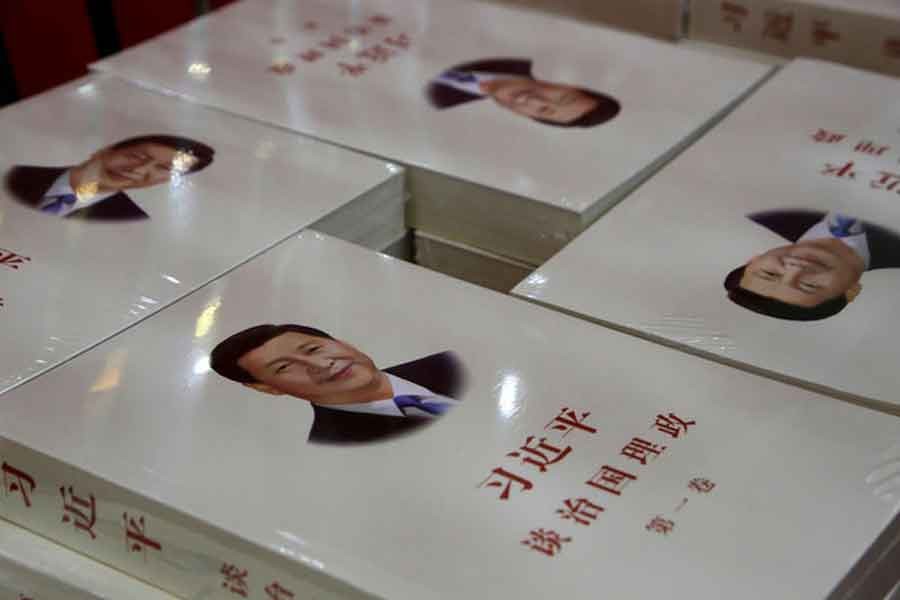Armed with interactive online courses, generous funding and new dedicated research institutes, China’s universities are on the frontlines of an effort to promote the thinking of President Xi Jinping to China and the world.
Since October, many universities across China have placed “Xi Thought” at the core of their curricula – the first time since the era of Mao Zedong that a Chinese leader has been accorded similar academic stature.
Mandatory ideology classes have been updated by the universities in response to instruction from the leadership that Xi’s ideas must enter the textbooks, classrooms and minds of students.
For Hu Angang, an economics professor at the prestigious Tsinghua University and an expert in the field of “Chinese exceptionalism”, the emergence of a leader like China has been a long time coming.
Hu has for decades argued that China’s unique political system would eventually guide the country to become a superpower on par with the United States.
Now he is among a growing number of thinkers studying what is officially known as “Xi Jinping Thought for Socialism with Chinese Characteristics for a New Era” and disseminating it to students and officials.
“Xi’s proposals are all beneficial for the world, they are incomparable,” Hu said in his office on the Tsinghua campus in northwest Beijing.
“China has entered a new era and is beginning to provide public goods to the world, just as I said it would ten years ago.”
The mobilisation by the universities, aside from securing support for Xi, is an attempt to return Communist Party ideology to pride of place in a society that has grown politically apathetic during decades of rapid economic growth, experts of Chinese politics say.
Xi wants the party’s values to be better accepted by Chinese people so as to foster additional legitimacy, according to Michael Gow, an expert on Chinese higher-education at Xian Jiaotong-Liverpool University in the eastern city of Suzhou.
“The difference Under Xi is that he is trying to expand the values of the state so that they appeal and resonate more with people that the state wants to exert dominance over,” he said.
The push to reinvigorate acceptance of party ideology comes as China’s rubber-stamp parliament in March scrapped term limits for the presidency, clearing the way for Xi to rule for life, a decision that sparked widespread unease.
Alternative path
Xi Thought, which is literally the collection of his public statements, is an all-encompassing guide for China’s professed aims of becoming an economic and military power by 2050, under the strict control of the ruling Communist Party.
A decade ago, Hu would teach his students about the work of the World Bank as a gold standard for development, he says.
“But from 2015 I began to change my classes, because China was now in front and the world was behind,” said Hu, a prominent public intellectual in China, who wears a watch on each wrist and grows animated when speaking of his favourite subject.
Personal support for Xi is nothing new, but the ideology drive goes further by attempting to build support for his ideas and leadership among officials and in elite institutions.
Not everyone shares Hu’s passion, however.
An undergraduate economics student at a university in Beijing with a Xi Thought institute said that political discussions still lacked any real link to people’s lives.
Xi Thought is all about slogans and targets, the student said, declining to be identified.
“The concepts are not objectively worked out at all, which is to say the ideas don’t have internal logic,” the student said.
Since October, at least 30 Xi Thought research institutes have been established in universities, governments and ministries, while lecture courses for students, officials and ordinary people have been organised across the country.
Beijing’s Xi Thought institute has a 2018 budget of 16 million yuan ($2.5 million), according to the Beijing Federation of Social Sciences. Researchers who apply for funding through the centre can get from 80,000 to 300,000 yuan for projects.
The most prestigious annual grants in China, the National Social Sciences Fund, in June announced that funding for 2018 was awarded to 90 research projects with Xi’s name in the title, 240 projects on the “new era”, a signature Xi slogan, and dozens more on other Xi Thought-related policy initiatives.
Xie Yanmei, a Beijing-based political analyst at Gavekal, a research firm, said that Xi’s fusing of nationalism and traditional Chinese values had wider appeal today than Mao or Marx, which have been part of mandatory “patriotic” education.
“Classes on Marxism and Mao might not create true believers, but they create the sense that in order to get ahead you have to speak the language, you have to participate in the shared make-believe,” she said.
But there are elements of Xi Thought that do have real appeal for some students, she said.
“The sense of a Chinese nation being led by Chinese values towards a great rejuvenation is, I think, working”.


